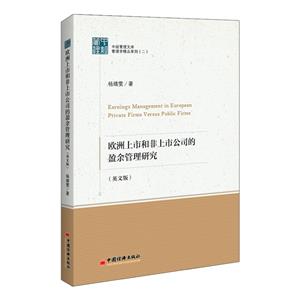歐洲上市和非上市公司的盈余管理研究(英文版) 版權(quán)信息
- ISBN:9787513658836
- 條形碼:9787513658836 ; 978-7-5136-5883-6
- 裝幀:一般膠版紙
- 冊(cè)數(shù):暫無
- 重量:暫無
- 所屬分類:>>
歐洲上市和非上市公司的盈余管理研究(英文版) 內(nèi)容簡(jiǎn)介
自20世紀(jì)80年代起, 盈余管理一直是會(huì)計(jì)學(xué)界研究的熱點(diǎn)問題, 但很多研究都是圍繞上市公司展開。然而, 僅關(guān)注上市公司, 往往無法區(qū)分盈余管理是基于會(huì)計(jì)的監(jiān)督還是資本市場(chǎng)壓力的影響。因此, 比較上市公司和非上市公司有助于評(píng)估資本市場(chǎng)壓力對(duì)盈余管理的影響。另一方面, 非上市公司作為市場(chǎng)經(jīng)濟(jì)中的重要組成部分, 和上市公司在規(guī)模、所有權(quán)和內(nèi)部管理上都存在著較大的差異。而這些差異也有可能造成公司參與的盈余管理的動(dòng)機(jī)和程度有所不同。所以, 通過對(duì)非上市公司盈余管理的研究, 也能豐富人們對(duì)其財(cái)務(wù)報(bào)告質(zhì)量的了解。
歐洲上市和非上市公司的盈余管理研究(英文版) 目錄
ContEnts
Chapter 1 Introduction
1.1 Background information and motivation
1.2 Objectives of the study
1.3 Research design
1.4 Main empirical results
1.5 Contributions
1.6 Study organisation
Chapter 2 Literature review
2.1 Introduction
2.2 Private and public firms
2.2.1 What are“private firms and public firms?”
2.2.2 The differences between private and public firms
2.2.3 How are private firms’financial reporting regulated across countries?
2.3 Earnings management
2.3.1 Concept and definitions of earnings management
2.3.2 Theoretical frameworks of earnings management
2.3.3 Measures of earnings management
2.3.4 The motivation of earnings management
2.3.5 Prior empirical evidence on earnings management of private firms versus public firms
2.3.6 The review of earnings quality
2.4 International Financial Reporting Standards (IFRS)
2.4.1 Arguments for and against IFRS adoption on earnings management
2.4.2 Empirical evidence on IFRS adoption and earnings management
2.5 Factors affecting earnings management between private and public firms
2.5.1 Country-level factors
2.5.2 Firm-level factors
Chapter 3Earnings management in European private versus public firms
3.1 Introduction
3.2 Relevant literature and development of hypotheses
3.2.1 Literature on earnings management
3.2.2 The effects of mandatory IFRS adoption on earnings management
3.2.3 Country-level factors and earnings management
3.3 Data and research methodology
3.3.1 Data collection and sample selection
3.3.2 Research methodology
3.4 Empirical results
3.4.1 Descriptive statistics
3.4.2 Univariate comparison between pre- and post-IFRS adoption
3.4.3 The influence of country-level factors
3.4.4 The effects of the financial crisis
3.5 Conclusions
Chapter 4Accrual based earnings management in European private versus public firms
4.1 Introduction
4.2 Relevant literature and development of hypotheses
4.2.1 Comparing earnings management between private and public firms
4.2.2 The effects of mandatory IFRS adoption on earnings management
4.2.3 Factors affecting differential earnings management between private and public firms
4.3 Data and research methodology
4.3.1 Data collection and sample selection
4.3.2 Research methodology
4.4 Empirical results
4.4.1 Descriptive statistics
4.4.2 Regression analysis
4.4.3 Variables that could have influenced the differential
earnings management between private and public firms
4.4.4 Additional tests
4.5 Conclusions
Chapter 5Real earnings management in European private and public firms
5.1 Introduction
5.2 Relevant literature and development of hypotheses
5.2.1 Literature on real earnings management
5.2.2 Real earnings management in private and public firms
5.2.3 IFRS adoption and earnings management
5.2.4 Factors affecting differential real earnings management between private and public firms
5.3 Data and research methodology
5.3.1 Data collection and sample selection
5.3.2 Research methodology
5.4 Empirical results
5.4.1 Descriptive statistics
5.4.2 Regression analysis
5.4.3 Additional tests
5.4.4 Analyses of incentive-based real earnings management
5.5 Conclusions
Chapter 6 Summary and conclusion
6.1 Summary of the study
6.2 Research implications
6.3 Limitations and suggestions for future research
Reference
AppendixContEnts
Chapter 1 Introduction
1.1 Background information and motivation
1.2 Objectives of the study
1.3 Research design
1.4 Main empirical results
1.5 Contributions
1.6 Study organisation
Chapter 2 Literature review
2.1 Introduction
2.2 Private and public firms
2.2.1 What are“private firms and public firms?”
2.2.2 The differences between private and public firms
2.2.3 How are private firms’financial reporting regulated across countries?
2.3 Earnings management
2.3.1 Concept and definitions of earnings management
2.3.2 Theoretical frameworks of earnings management
2.3.3 Measures of earnings management
2.3.4 The motivation of earnings management
2.3.5 Prior empirical evidence on earnings management of private firms versus public firms
2.3.6 The review of earnings quality
2.4 International Financial Reporting Standards (IFRS)
2.4.1 Arguments for and against IFRS adoption on earnings management
2.4.2 Empirical evidence on IFRS adoption and earnings management
2.5 Factors affecting earnings management between private and public firms
2.5.1 Country-level factors
2.5.2 Firm-level factors
Chapter 3Earnings management in European private versus public firms
3.1 Introduction
3.2 Relevant literature and development of hypotheses
3.2.1 Literature on earnings management
3.2.2 The effects of mandatory IFRS adoption on earnings management
3.2.3 Country-level factors and earnings management
3.3 Data and research methodology
3.3.1 Data collection and sample selection
3.3.2 Research methodology
3.4 Empirical results
3.4.1 Descriptive statistics
3.4.2 Univariate comparison between pre- and post-IFRS adoption
3.4.3 The influence of country-level factors
3.4.4 The effects of the financial crisis
3.5 Conclusions
Chapter 4Accrual based earnings management in European private versus public firms
4.1 Introduction
4.2 Relevant literature and development of hypotheses
4.2.1 Comparing earnings management between private and public firms
4.2.2 The effects of mandatory IFRS adoption on earnings management
4.2.3 Factors affecting differential earnings management between private and public firms
4.3 Data and research methodology
4.3.1 Data collection and sample selection
4.3.2 Research methodology
4.4 Empirical results
4.4.1 Descriptive statistics
4.4.2 Regression analysis
4.4.3 Variables that could have influenced the differential
earnings management between private and public firms
4.4.4 Additional tests
4.5 Conclusions
Chapter 5Real earnings management in European private and public firms
5.1 Introduction
5.2 Relevant literature and development of hypotheses
5.2.1 Literature on real earnings management
5.2.2 Real earnings management in private and public firms
5.2.3 IFRS adoption and earnings management
5.2.4 Factors affecting differential real earnings management between private and public firms
5.3 Data and research methodology
5.3.1 Data collection and sample selection
5.3.2 Research methodology
5.4 Empirical results
5.4.1 Descriptive statistics
5.4.2 Regression analysis
5.4.3 Additional tests
5.4.4 Analyses of incentive-based real earnings management
5.5 Conclusions
Chapter 6 Summary and conclusion
6.1 Summary of the study
6.2 Research implications
6.3 Limitations and suggestions for future research
Reference
Appendix
歐洲上市和非上市公司的盈余管理研究(英文版) 作者簡(jiǎn)介
楊婧雯,女,1991年3月生于湖南邵陽(yáng)。2010年入英國(guó)蘭卡斯特斯特大學(xué)會(huì)計(jì)系讀書。2013年入英國(guó)班戈大學(xué),于2018年獲得會(huì)計(jì)學(xué)博士,畢業(yè)后加入班戈大學(xué)中國(guó)校區(qū)任教。現(xiàn)為北京第二外國(guó)語(yǔ)學(xué)院商學(xué)院講師。目前主要從事財(cái)務(wù)會(huì)計(jì)教學(xué)與會(huì)計(jì)信息質(zhì)量,國(guó)際會(huì)計(jì)準(zhǔn)則的研究工作。
- >
羅庸西南聯(lián)大授課錄
- >
中國(guó)歷史的瞬間
- >
自卑與超越
- >
我從未如此眷戀人間
- >
大紅狗在馬戲團(tuán)-大紅狗克里弗-助人
- >
羅曼·羅蘭讀書隨筆-精裝
- >
月亮與六便士
- >
二體千字文















